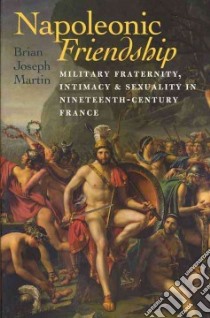- Libreria
- >
- Libri in lingua
- >
- Storia e archeologia
- >
- Storia
Napoleonic Friendship - 9781584659563
Un libro in lingua di Martin Brian Joseph edito da Univ Pr of New England, 2011
- € 42.50
- Il prezzo è variabile in funzione del cambio della valuta d’origine
Following the French Revolution, radical military reforms created conditions for new physical and emotional intimacy between soldiers, estabilishing a model of fraternal affection that would persist from the revolutionary and Napoleonic wars through the Franco-Prussian War and World War I.
Based on extensive research in French and American archives, and enriched by his reading of Napoleonic military memoirs and French military fiction from Hugo and Balzac to Zola and Proust, Brian Joseph Martin's view encompasses a broad range of emotional and erotic relationships in French armies from 1789 to 1916. He argues that the French Revolution's emphasis on military fraternity evolved into an unprecedented sense of camaraderie among soldiers in the armies of Napoleon. For many soldiers, the hardships of combat led to intimate friendships. For some, the homosociality of military life inspired mutual affection, lifelong commitment, and homoerotic desire.
"This book suggests a revolution in how we frame our discussion of intimacy. The field of queer studies has often stressed that, historically, men were more likely to realize their same-sex longings than women, but did so through anonymous casual encounters, often at the expense of actual intimacy and enduring relationships. Martin turns that paradigm on its head, and argues that men did indeed find enduring forms of intimacy through the shared trial and experiences of membership in the military. He brings to the surface a narrative that has just been waiting to be given voice." Melanie Hawthorne Texas A&M University
"This eye-opening study fills a significant lacuna in our understanding of nineteenth-century French literature and the history of relations among men. Martin's fresh and often moving account evokes a partriarchal world without women where homosociality, and sometimes homosexuality, were both desirable and necessary." Margaret Waller Pomona College
Informazioni bibliografiche
- Titolo del Libro in lingua: Napoleonic Friendship
- Sottotitolo: Military Fraternity, Intimacy, and Sexuality in Nineteenth-century France
- Autore: Martin Brian Joseph
- Editore: Univ Pr of New England
- Collana: Univ Pr of New England (Paperback)
- Data di Pubblicazione: 11 Gennaio '11
- Genere: HISTORY
- Pagine: 379
- ISBN-10: 1584659564
- EAN-13: 9781584659563


